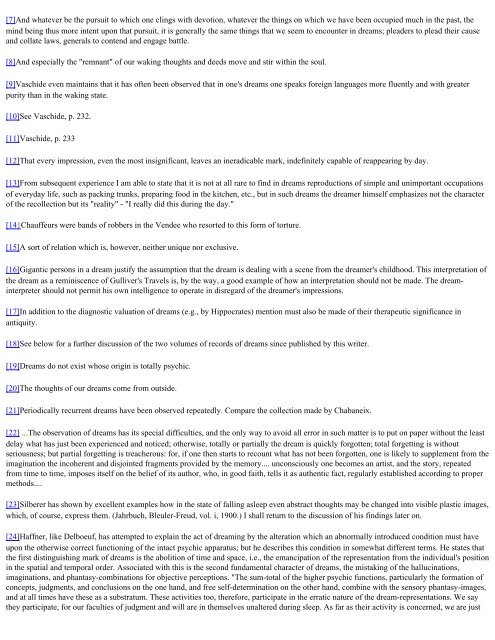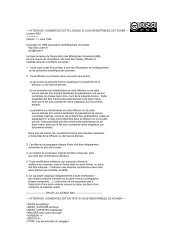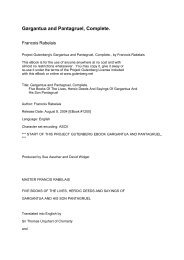The Interpretation of Dreams Sigmund Freud (1900)
The Interpretation of Dreams Sigmund Freud (1900)
The Interpretation of Dreams Sigmund Freud (1900)
You also want an ePaper? Increase the reach of your titles
YUMPU automatically turns print PDFs into web optimized ePapers that Google loves.
[7]And whatever be the pursuit to which one clings with devotion, whatever the things on which we have been occupied much in the past, the<br />
mind being thus more intent upon that pursuit, it is generally the same things that we seem to encounter in dreams; pleaders to plead their cause<br />
and collate laws, generals to contend and engage battle.<br />
[8]And especially the "remnant" <strong>of</strong> our waking thoughts and deeds move and stir within the soul.<br />
[9]Vaschide even maintains that it has <strong>of</strong>ten been observed that in one's dreams one speaks foreign languages more fluently and with greater<br />
purity than in the waking state.<br />
[10]See Vaschide, p. 232.<br />
[11]Vaschide, p. 233<br />
[12]That every impression, even the most insignificant, leaves an ineradicable mark, indefinitely capable <strong>of</strong> reappearing by day.<br />
[13]From subsequent experience I am able to state that it is not at all rare to find in dreams reproductions <strong>of</strong> simple and unimportant occupations<br />
<strong>of</strong> everyday life, such as packing trunks, preparing food in the kitchen, etc., but in such dreams the dreamer himself emphasizes not the character<br />
<strong>of</strong> the recollection but its "reality" - "I really did this during the day."<br />
[14}Chauffeurs were bands <strong>of</strong> robbers in the Vendee who resorted to this form <strong>of</strong> torture.<br />
[15]A sort <strong>of</strong> relation which is, however, neither unique nor exclusive.<br />
[16]Gigantic persons in a dream justify the assumption that the dream is dealing with a scene from the dreamer's childhood. This interpretation <strong>of</strong><br />
the dream as a reminiscence <strong>of</strong> Gulliver's Travels is, by the way, a good example <strong>of</strong> how an interpretation should not be made. <strong>The</strong> dreaminterpreter<br />
should not permit his own intelligence to operate in disregard <strong>of</strong> the dreamer's impressions.<br />
[17]In addition to the diagnostic valuation <strong>of</strong> dreams (e.g., by Hippocrates) mention must also be made <strong>of</strong> their therapeutic significance in<br />
antiquity.<br />
[18]See below for a further discussion <strong>of</strong> the two volumes <strong>of</strong> records <strong>of</strong> dreams since published by this writer.<br />
[19]<strong>Dreams</strong> do not exist whose origin is totally psychic.<br />
[20]<strong>The</strong> thoughts <strong>of</strong> our dreams come from outside.<br />
[21]Periodically recurrent dreams have been observed repeatedly. Compare the collection made by Chabaneix.<br />
[22] ...<strong>The</strong> observation <strong>of</strong> dreams has its special difficulties, and the only way to avoid all error in such matter is to put on paper without the least<br />
delay what has just been experienced and noticed; otherwise, totally or partially the dream is quickly forgotten; total forgetting is without<br />
seriousness; but partial forgetting is treacherous: for, if one then starts to recount what has not been forgotten, one is likely to supplement from the<br />
imagination the incoherent and disjointed fragments provided by the memory.... unconsciously one becomes an artist, and the story, repeated<br />
from time to time, imposes itself on the belief <strong>of</strong> its author, who, in good faith, tells it as authentic fact, regularly established according to proper<br />
methods....<br />
[23]Silberer has shown by excellent examples how in the state <strong>of</strong> falling asleep even abstract thoughts may be changed into visible plastic images,<br />
which, <strong>of</strong> course, express them. (Jahrbuch, Bleuler-<strong>Freud</strong>, vol. i, <strong>1900</strong>.) I shall return to the discussion <strong>of</strong> his findings later on.<br />
[24]Haffner, like Delboeuf, has attempted to explain the act <strong>of</strong> dreaming by the alteration which an abnormally introduced condition must have<br />
upon the otherwise correct functioning <strong>of</strong> the intact psychic apparatus; but he describes this condition in somewhat different terms. He states that<br />
the first distinguishing mark <strong>of</strong> dreams is the abolition <strong>of</strong> time and space, i.e., the emancipation <strong>of</strong> the representation from the individual's position<br />
in the spatial and temporal order. Associated with this is the second fundamental character <strong>of</strong> dreams, the mistaking <strong>of</strong> the hallucinations,<br />
imaginations, and phantasy-combinations for objective perceptions. "<strong>The</strong> sum-total <strong>of</strong> the higher psychic functions, particularly the formation <strong>of</strong><br />
concepts, judgments, and conclusions on the one hand, and free self-determination on the other hand, combine with the sensory phantasy-images,<br />
and at all times have these as a substratum. <strong>The</strong>se activities too, therefore, participate in the erratic nature <strong>of</strong> the dream-representations. We say<br />
they participate, for our faculties <strong>of</strong> judgment and will are in themselves unaltered during sleep. As far as their activity is concerned, we are just









